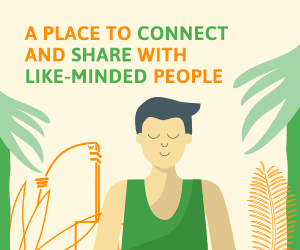By changing perspective to look at an apparently negative situation in a different way, we can imagine a more positive story – one that's more likely to lead to greater happiness. Ed Gould examines how gaining perspective also offers up a chance to consider others, too.
It's part of human nature to think about oneself and to focus on what's going on around us, but this one-dimensional perspective can lead to a false sense of priorities. How do we break out from a parochial view of our lives and start to see things as they really are? By changing perspective, we can gain greater insights and gain deeper happiness.
Changing perspective is a healthy exercise if we want to be empathetic, rational and more compassionate. However, changing perspective is not merely about seeing things from the point of view of another. It's just as much about gaining perspective.
In other words, our sense of compassion for others need not be the driver for looking for an alternative angle on things. It can help us escape the happiness trap and develop a higher level of understanding, too. In fact, simply seeing things another way is good for us not only because it means getting out of a mental rut, but because of what we might be missing out on.
Changing and gaining perspective: a classical illustration
The famous Greek philosopher Plato once taught his pupils by coming up with an allegory of a cave. The prisoners in his cave cannot see reality, merely a shadow of it because they are in chains. All they need to gain a higher level of comprehension is to see what is causing the shadows to form – to see things as they really are.
In the allegory, this would mean that the cave dwellers would need to break free from their chains. In a sense, altering our perspective on things means breaking free from mental chains.
Happy help: change perspective and your mood, too!
To extend Plato's metaphor in this manner is fair because a change of perspective takes effort. Most of us are happy enough to keep moving on in our lives the way we always have – especially if we feel a degree of happiness in our current situation. Nevertheless, unless the mental effort is made, we'll never know what lies beyond the cave or what is causing the shadows to fall against its wall. As such, changing and gaining perspective can be seen as the same thing.
Changing your perspective: the benefits
However, to get a handle on the advantages of a change of perspective, there's no need to go back to ancient Greece. There are plenty of illustrations from more modern times. The author and thinker Benjamin Grant cites just one such example.
• JOIN US! Learn more about human connection and psychology •
During the Apollo missions, when NASA was working towards putting a man on the moon, the astronaut Bill Anders took one of the most iconic images ever to have been captured by a camera. During the Apollo 8 mission of 1968, the spacecraft orbited the moon several times. As the ship passed by the moon's horizon, he was the first man to see the Earth rise from the moon's perspective. His world famous 'Earthrise' shot, according to Grant, is so iconic because it shows humanity from a different viewpoint.
It should be said that this new perspective is no mere novelty which only looks pretty – although the image is beautiful. The point of view it offers is mind altering. That is its message, its benefit, if you will. The 'Earthrise' photograph captures all of humanity, bar the astronauts on the mission, and shows something that feels so anchored and permanent – our planet – spinning in the lonely vastness of space.
“Changing perspective is a healthy exercise if we want to be empathetic, rational and compassionate.”
If you think that such an image is mind-altering from Earth, then consider just how many astronauts have returned from space missions with a new perspective on life and humanity. This, Grant says, is the so-called 'overview effect', which is a consequence of space travel. It can cause profound changes in our brains.
Grant has harnessed the 'overview effect' in his work. A creator of images, he takes some of the most stunning photographs captured by satellites above Earth and uses them to create pictures that are designed to alter minds back on the planet.
A change of perspective: fruit orchards in Huelva, Spain © Benjamin Grant
Whether his images are of the tulip fields of the Netherlands, fruit orchards in Spain or refugee camps in northern Kenya, he is exposing us to the truth, but not as we know it. The colours, the scale and the perspective – everything is shot from above, as you would expect – and gives us a view of the world we might know, but also knowingly ignore. His images offer us the chance to gain insights into the fragility of ecosystems, the plight of fellow humans and, yes, to simply marvel at the beauty of the planet.
RELATED: When Life Gives You Lemons, Try Lemonading!
If you're looking for up-sides of gaining a new perspective, then as a way to increase happiness levels, it's right up there. If your focus is on something that you perceive to be negative in your life and you come at it from a different angle, then you can feel better about it.
What's more, you might even find that it helps you to perform better as a result. This approach is called reframing and is just one way in which you can derive benefits from gaining new perspectives. Let's look at some more techniques that will allow you to feel more confident, less self-critical and to enjoy more happiness.
Perspective and point of view: how to change yours
For many, altering perspective means becoming less self-centred and moving to a more compassionate understanding of others and the world around us. By stepping outside of our usual perspectives, it can become possible to frame arguments in ways that motivate others instead of leaving them feeling rejected, for example. Seeing things as 'bad' without taking a fresh view can mean that we get set into a closed loop of negativity.

Bright future: change your view and change your life
For instance, a relationship breakdown can sometimes lead to negative feelings about one's self-worth. However, a changed perspective might be that becoming single is the start of something new. As a result of reframing your view, you might even gain a higher perspective of yourself, embracing the part of yourself which might not have felt room for self-expression within the relationship. In fact, academics have done plenty of research into the techniques that will allow us to see things in a new light. Here's a look at four of the ways you can change and gain perspective.
1. Reframing your past
As previously mentioned, reframing your point of view can lead to tremendously helpful results and renewed chances of happiness. This is particularly effective if you reframe the way in which you see your past. For example, you might say that certain negative outcomes are always bound to happen because of 'the way you are'. You might have been told that you are impulsive or even hot-headed by others and believe this of yourself.
“If your focus is on something that you perceive to be negative in your life and you come at it from a different angle, then you can feel better about it.”
However, studies have shown that reframing a negative attribute from your past as a positive one can heighten your performance. Try relabelling your so-called impulsive past as creative, for example, and see how the new perspective can impact on your present.
2. A change of perspective: problem solving
Expressing ourselves is optimistic – in other words, positive, complimentary and generous – and we will naturally develop higher levels of self-esteem and a healthier self-image. By getting into the habit of being positive, we can deal with criticism and setbacks much better. Not only does this altered perspective mean that we are better set against potential adversity, but our ability to problem-solve also becomes more efficient.
In her book, Putting the Positive Thinker to Work, Potter outlines how reframing perspectives can augment levels of commitment, especially at work, and lead to greater persistence with tasks. This, she argues, is the foundation for most success in the workplace.

Another viewpoint: change perspective, retell your story
3. Compassion and understanding
By gaining new perspectives, we can become more compassionate to others. It's important not to fall back into bad habits of negative thinking, however. A daily ritual of positive affirmation of yourself and those around you can help to keep your understanding of the world fixed in a better perspective than it otherwise might be.
• BE INSPIRED! Join our compassion and curious community •
Indeed, so-called 'silver lining thinking' will help you to see the good in events and to reframe problems as challenges. If you can consciously interrupt negative thoughts that might pop into your head, then this will help you to remain the compassionate person you want to be.
4. Seeing the bigger picture
Finally, seeing the bigger picture means sometimes taking a step back and creating time to gain the sort of perspective you'll need for your happiness and compassion. From an astronaut's point of view, seeing the bigger picture comes from literally taking in a macro view of the world.
However, we can do this for ourselves, too. Take time to clear your mind, listen to the wind in the trees and rush a little less. Ask yourself what truly counts in your life and, of course, the benefits of meditation can help you to gain insights into what's most important. By changing your perspective on your life you can change the course of it and find greater joy. ●
Main image: Benjamin Grant
happiness.com | The fine art of being: learn, practice, share
Are you a happiness.com member yet? Sign up for free now to:
■ enjoy our happiness magazine
■ share and support in our happiness forum
■ self-develop with free online Academy classes
Written by Ed Gould
 Ed Gould is a UK-based journalist and freelance writer. He's also a practitioner of Reiki.
Ed Gould is a UK-based journalist and freelance writer. He's also a practitioner of Reiki.





Join the conversation
You are posting as a guest. If you have an account, sign in now to post with your account.
There are no comments to display.